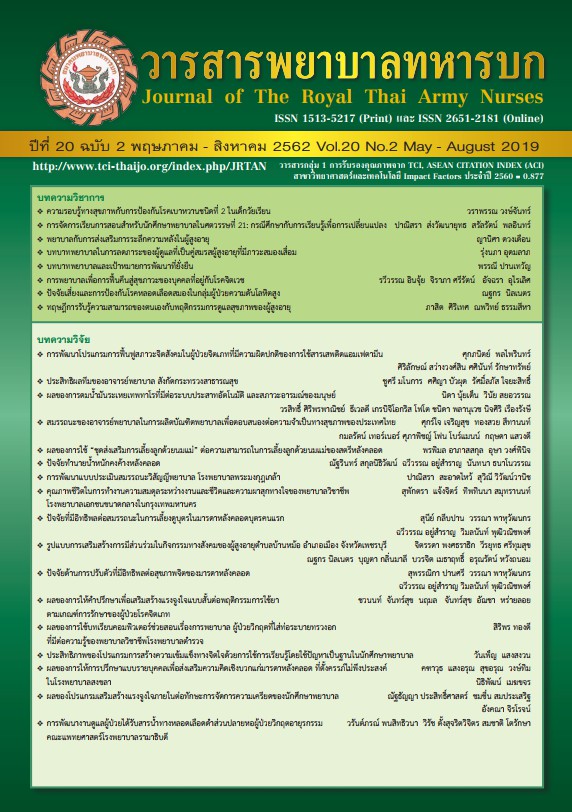Development of a Family Participation Model for Promoting Child Development: A Case Study of Ban Sanpamuang Child Care Center, Mueang District, Phayao Province.
Keywords:
development of model, family participation, and promoting child developmentAbstract
This participatory action research aimed to develop a model of family participation for promoting child development and to study the effectiveness of a model of family participation for promoting child development. The samples in this study included: Group 1 for developed the model included 8 main leaders selected by purposive sampling method. Group 2 was the target group that included 31 dyads of children and their parent who was representing their family. The research methodology included 3 phases: preparation phase, implementation phase, and evaluation phase. The research instruments were parental behaviors on promoting child development questionnaires, and the Denver Developmental Screening Test II (Denver II). The data were analyzed by using descriptive statistics, t-test, and McNemar test. The study findings revealed 1) the family participation model for promoting child development consisted of 5 components: assessing the problem, data presentation and analysis, activities, parents’ participation, and evaluation; 2) the mean score of parental behaviors on promoting child development after using the model significantly increased at .05; and 3) child development after using the model significantly changed at .05.
Downloads
References
Kue-iad N, Chaimay B, Woradet S. Early Childhood Development among Thai Children Aged Under 5 Years: A Literature Review. The Southern College Network Journal of Nursing and Public Health. 2018; 5(1): 218-296. (in Thai)
Cook JL, Cook G. Child Development: Principles and Perspectives. 2nded. Boston: Pearson; 2010.
Bjorklund DF, Blasi CH. Child & Adolescent Development: An Integrated Approach. Canada: Wadsworth Cengage Learning; 2012.
National Institute of Child Health, Department of Health: Ministry of Public Health. Annual Report 2017. Bangkok: Samcharoen Panich; 2017. (in Thai)
Martorell G, Papalia DE, Feldman RD. A child’s world: infancy through adolescence. New York: Mc Graw Hill Education; 2014.
Thisara P, Ponmark J, Seekhao P. Sinlapawitthayathon B. Predictive Factors of Parental Behaviors on Promoting Early Childhood Development in Phayao Province. Journal of Nursing and Health Care. 2017; 35(2): 169-176. (in Thai)
Sriwongpanich N. Developmental promotion. In: Hansakunachai T, Roongpraiwan R, Sutchritpongsa S, Chonchaiya W, editors. Textbook of Child development and behavior: Caring for healthy children. 3 vols. Bangkok: Beyond enterprise; 2012. p. 94-107. (in Thai)
McDevitt TM, Ormrod JE. Child development and education. Harlow: Pearson; 2014.
Cohen JM, Uphoff NT. Participation’s place in rural development: seeking clarity through specificity. World development. 1980; 8(3): 213-35.
Chaichanasang T, Posri A, Tangtumpitak T. The family participation in child development stimulation and promotion at child development center. Journal of Nursing Science & Health. 2018; 40(1): 95-104. (in Thai)
Kemmis S, McTaggart R. The action research planner. 3rd ed. Victoria: Deakin University Press; 1988. p. 8-11.
Kotchabhakdi N, Lertawasadatrakul O. Trainning Manual Denver II. 6thed. Nakhonpathom: Graphic One; 2015. p. 1-6. (in Thai)
Chawaphanth S. Effects of teaching program on knowledge and behaviors of Guardians in promoting preschool child development at the Paemaefackmai day-care center. Chiangmai: Mccormick Faculty of Nursing, Payap University; 2008. (in Thai)
Knodel J, Nguyen MD. Grandparents and grandchildren: care and support in Myanmar, Thailand and Vietnam. Ageing & Society. 2015; 35(9): 1960-88.
Jundaboot W, Yoosook W, Semrum W. Development guideline for promotion of preschoolers in child development center, Sewichian Municipal Subdistrict, Numyuen District, Ubonratchathani Province. Journal of Education Research Faculty of Education, Srinakharinwirot University. 2018; 13(1): 208-219. (in Thai)
Ridthplake S. The development on model for the promotion of 1 – 3 year old child development through the participation of family and community: A case study of Tambon Banyang, Amphoe Meuang, Changwat Burirum. Research and Development Journal, Loei Rajabhat University. 2016; 11: 99-109. (in Thai)
Thangtumpituk T. The Development of a Health Promotion Model for Children with the Community Participation. Journal of The Royal Thai Army Nurses. 2018; 19 Suppl May-August: 222-229. (in Thai)
Trakarnrungsee A, Sirisopon N, Boonchaythanasit K. Effectiveness of Health Education Program to Promote First Mothers’sChild Rearing Behavior with 2 - 6 Months Old Child at PranangklaoHospital Nonthaburi Province. Journal of The Royal Thai Army Nurses. 2015; 16(3): 23-31. (in Thai)
Kaiyarach N. The effect of family competency development program on family’s knowledge, attitude and behavior for promoting toddler development [dissertation]. Chonburi: Brurapha University; 2011. (in Thai)
Siriumpunkul P. Effectiveness of Parental Competencies and developmental Stimulation Program by Playing on the Knowledge, Parental Child-Care, and Adaptive behavior of children with Autism. Journal of The Royal Thai Army Nurses. 2015; 20(1): 311-320. (in Thai)
Downloads
Published
How to Cite
Issue
Section
License
บทความหรือข้อคิดเห็นใดใดที่ปรากฏในวารสารพยาบาลทหารบกเป็นวรรณกรรมของผู้เขียน ซึ่งบรรณาธิการหรือสมาคมพยาบาลทหารบก ไม่จำเป็นต้องเห็นด้วย
บทความที่ได้รับการตีพิมพ์เป็นลิขสิทธิ์ของวารสารพยาบาลทหารบก
The ideas and opinions expressed in the Journal of The Royal Thai Army Nurses are those of the authors and not necessarily those
of the editor or Royal Thai Army Nurses Association.






